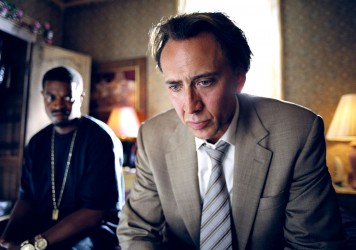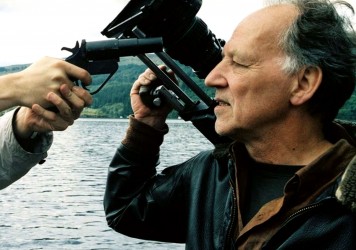Werner Herzog’s 1972 masterpiece returns to the big screen, which is a cause for major celebration.
One of the true greats, this, an adventure saga about the ultimate futility of existence. Werner Herzog accompanies his not-so-merry band of travellers through the low-clouds and down the deadly winding trails of a mountain in the Amazon. They are indistinct specks on the landscape, consumed entirely by nature’s all-conquering awesomeness.
The year is 1560, and Spanish conquistador Don Francisco Pizarro has been given his orders by the king of Spain to enter the heart of darkness and locate the mythical, gold-plated paradise of El Dorado. When rations run low, he passes the reigns over to Klaus Kinski’s Don Lope de Aguirre who drags his advance party to the verge of insanity and beyond.
Listing this film’s pleasures is an activity to which you could dedicate entire lifetimes, so here we’re just going to focus on one: Klaus Kinski’s miraculous central performance. It takes a while for him to become the central focus of the film, as his team of explorers is duly whittled down in the film’s opening acts. He’s initially reticent to take centre stage, even after fronting a coup which successfully ousts the de facto leader (who, with loathsome cowardice, wants to turn back).
Kinski projects violence through actions rather than words. He throttles his comrades with his eyes, transmitting sub-sonic hate bulletins via his brusque body language which state that anyone who dares affront his iron will might find themselves on the business end of his infinite ire. Democracy doesn’t stand a chance against Kinski’s laser eye, as seen in the riverside vote scene where Aguirre doesn’t so much intimidate the electorate as psychologically fill their ballot papers in for them.
So he’s something of a combustible presence, then. Yet there’s something strangely pathetic about Aguirre, that his spindly frame might not fully support his splenetic bursts of anger. He has bizarre, simian hunch. He gallops inelegantly rather than dashes when the raft occasionally docks. It’s like a reference to Richard III, a malformed tyrant whose personal concerns leave him entirely divorced from the primal desires of the remainder of the human race. With his shoulders at a constant angle, Kinski addresses his proclamations to the skies as much as he does his supporting cast, as if he’s in a direct dialogue with God. It really is a performance that’s been teleported in from the silent era.
He intones that famous line, “I am the wrath of God!”, while momentarily staring direct to camera. For a split second, Aguirre’s hubris suddenly extends beyond the closed world of the film and takes on a chilling universality The power that his Aguirre wields will be the cause of all pain and suffering, not just his subjects in El Dorado. It’s a chilling moment, glaring into those eyes and being told that you will be crushed by Aguirre. Time and geography offer no escape for nature’s indifferent brutality.
And perhaps best of all is the haunting final scene where our “hero” is now left alone on his raft, blind to the onslaught of the cosmos and the slings and arrows being flung by the invisible indigenous tribes. Has he succumbed to madness or is this the full expression of his natural state?
There’s cruelty in the way he picks up the monkeys and casually casts them into the river. But there’s sadness too, as his uncorrupted self-belief remains, even in the light of overwhelming odds. Unlike, say, Antoine Doinel who reached the edge of the world and was forced to turn back, Aguirre doesn’t even make it far enough to confirm that there was nothing there in the first place.
Published 7 Jun 2013
So many great Herzog films. Was this one of the good ones?
Oh Lord yes. Even after 41 years, this is one hell of a a stand-alone achievement.
A journey down river to the mouth of Hell, but also so much more.

A personal diary from a filmmaking workshop in Peru, hosted by the legendary German director.

By Josh Winning
A wildly entertaining off-kilter crime thriller from the dream team pairing of Werner Herzog and Nic Cage.

Two writers make their case for the most eccentric moment in the director’s career.